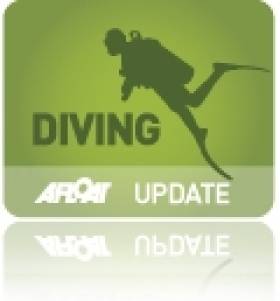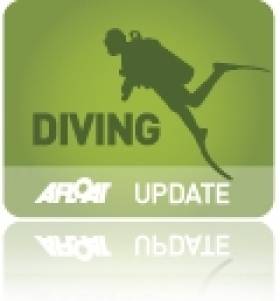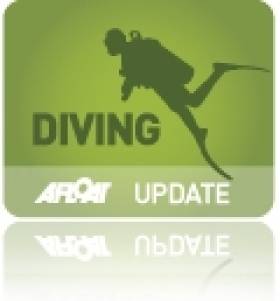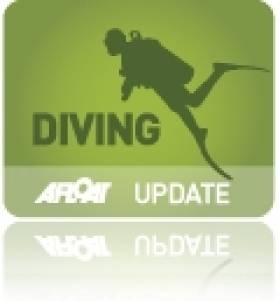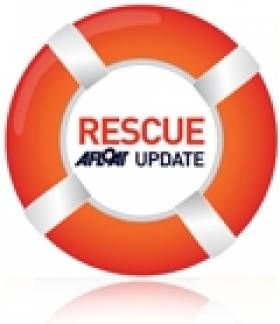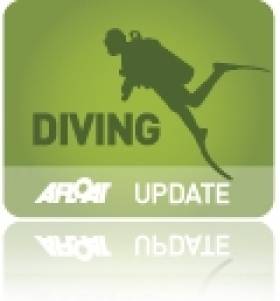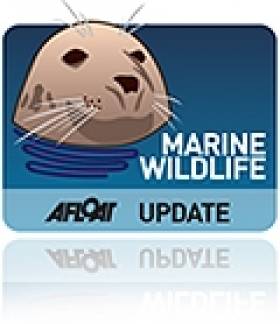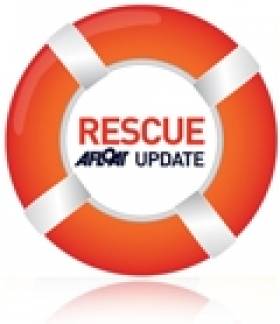Displaying items by tag: diving
Naas Sub Aqua Club Seeking New Members
#DIVING - Naas Sub Aqua Club is looking for new members from the East coast and the Midlands as it prepares to celebrate its 40th anniversary, the Leinster Leader reports.
The Co Kildare-based diving club is one of the most active in Ireland, with 40 members regularly going below the surface on weekly excursions from Coal Harbour, Slade Harbour or Kilmore Quay throughout the year.
Summer trips are also organised to locations as far afield as Gozo in the Mediterranean and Cuba in the Caribbean.
Novices are welcome, and anyone interested in getting into diving will be trained in full SCUBA equipment on Thursday evenings at the Curragh Pool over the winter, with open water dives set to resume in February 2013.
The Leinster Leader has more on the club and how to get in touch HERE.
Irishman Breaks Longest SCUBA Dive Record
#DIVING - Irish diver Paul Devane has smashed the Guinness World Record for the longest cold saltwater SCUBA dive in his second attempt.
Diving.ie reports that Devane set a time of 13 hours and 4 minutes off Killary in Co Galway on 9 October - breaking through the bar set by a Maltese team in February this year, who themselves broke the record set by Devane's brother Declan in 2009.
Speaking to the Irish Independent ahead of his successful second attempt, Devane said: "It will be cold, it will be long... There will be no breaks, no meals, no toilet stops."
Devane said his main aim was to raise money for his chosen charities Hang in Hand, supporting families of children with cancer, and the RNLI.
Find out more about Devane and his record-breaking dive HERE.
Video Shows Divers Exploring Carinthia Wreck Off Donegal
#DIVING - WorldIrish have done it again with another great video find - this time following a team of divers off Donegal as they explore the wreck of the RMS/HMS Carinthia.
On 6 June 1940, during the Second World War, the transatlantic steam-powered cruise liner turned armed merchant ship was sunk by a German U-boat off Tory Island.
The video above shows some of the sights seen by Michael McVeigh and his diving team, including the ship's bow, the anchor telegraph and its wartime addition 6" gun.
Galway Student Sub-Aqua Club Celebrates 50 Years Underwater!
#sub-aqua – In the year of its 50th anniversary, the NUIG/GMIT Sub-Aqua Club officially launched its new Rigid Inflatable Boat (RIB), Alice Perry, at a special ceremony in NUI Galway recently. Launched by NUI Galway's Vice-President for the Student Experience, Dr Pat Morgan, the RIB was blessed by the University's Chaplain, Fr Diarmuid Hogan.
In 2009 work began on raising funds to purchase a new offshore class RIB for the Club to allow greater access to some of the fantastic offshore dive sites that lie around Ireland. In late 2011, the NUI Galway Students Project Fund granted the remaining funds required.
The new 6.5m XS-650 RIB is named after NUI Galway graduate Alice Perry, who graduated with a first class honours degree in Civil Engineering in 1906. Alice was the first female to graduate with an engineering degree in Ireland or the UK. She went on to hold the position of County Surveyor for Galway, where her work included the inspection of Galway's piers, before later moving to London and eventually Boston.
Speaking at the launch, Martin Timoney of the NUIG/GMIT Sub-Aqua Club said: "I thank all those who helped in procuring the Clubs new RIB; from attaining the required funds, through the NUI Galway Students Project Fund, to the deriving the final specification for the RIB to is final delivery in late June. It has taken a lot of time and effort but the new RIB, Alice Perry will allow access to some fantastic dive sites for the club."
Annual events for the NUIG/GMIT Sub-Aqua Club include a Charity Fundraiser Dive with all the proceeds donated to local charities and groups involved in water safety where divers from the Club cumulatively spend 30 hours in the 3.5m deep tank in one hour time slots. This year over €1,600 was raised for the Galway RNLI Station and the Search and Recovery Unit of the Galway Sub Aqua Club. The Club also provides safety boat cover at a number of events, including Tri the Burren Triathlon and the Cope Triathlon, and this year the Volvo Ocean Race finale. Working with Galway Sub-Aqua Club, the Club provided safety boat cover in Galway Bay for each of the inshore practice and race days, as well as within the docks in the evenings.
The Club dives locally on a regular basis to such sites as Coral Beach, Bóthar Buí and Killary Fjord. Larger weekend trips also take place to dive sites all along the west coast, from Donegal to Cork. The Club is open to all current students, alumni or staff of NUI Galway or GMIT and training starts each year in September. For further information on the NUIG/GMIT Sub-Aqua Club, or to join, visit website www.galwaydiving.com.
To celebrate its 50th Anniversary the NUIG/GMIT Sub-Aqua Club are hosting a black tie gala ball in the Galway Bay Hotel on Saturday, 27 October. To find out more, or to purchase tickets for the ball visit www.galwaydiving.com.
Founded in 1962, the NUIG/GMIT Sub-Aqua Club is one of the oldest sub aqua clubs in the country. The UCG Diving Society was formed primarily by staff members of the then, University College Galway. In the 1990s, the Club formed an alliance with what was then the Regional Technical College, Galway, and when both colleges later changed their name, the Club became the NUIG/GMIT Sub-Aqua Club, as it is known today. Over the years, the Club has grown from strength to strength and in 2003, was named by Comhairle Fo-Thuinn (CFT), the agency under which the Club affiliates itself and trains under, as the largest training Club in the country, with more trainee certificates issued than any other CFT club in Ireland. The Club continues this success with a large number of current students, staff and alumni joining each year.
Diver Dies After Saltee Islands Incident
#RESCUE - RTÉ News reports that a man has died following a diving accident off the Saltee Islands at the weekend.
The 25-year-old is believed to have rapidly ascended from 25 metres below the surface while on a dive with three others on the morning of Saturday 22 September.
Irish Coast Guard operatives from Waterford and Kilmore Quay were involved in the operation to rescue the man, who was later pronounced dead at Waterford Regional Hospital.
Meanwhile, RTÉ News also reports on the rescue of a man from a burning motor cruiser off the Seven Heads Peninsula in West Cork on Saturday afternoon.
Crew aboard the Naval Service vessel LE Niamh, on patrol in the area, transferred the man from his vessel to Kinsale. The boat later sank after attempts to extinguish the fire.
NUI Galway Hosts Talk on Historical Wreck Diving in Ireland
#DIVING - The Sub-Aqua Club at NUI Galway and the Galway-Mayo Institute of Technology welcomes diving expert Edward Bourke to the NUI Galway campus on 18 October to give a talk on historical wreck diving in Ireland.
The talk will take a look at some of the exploits of wreck and salvage dives in Ireland over the years, exploring the nation of the Irish coast as a hotbed of pioneering subaquatic activity, driven mostly by the recovery of shipborne cannons - not only because of their expense, but also to prevent their falling into the hands of insurgents.
Bourke will give his talk at the Siobhán McKenna Theatre in the Arts Millennium Building at 7pm on Thursday 10 October. The evening will be of interest to local historians and divers alike. And as much of the activity was on the west coast, there is some local maritime interest, too.
Edward Bourke is a microbiologist, maritime historian and diver with Viking Sub Aqua in Dublin for 30 years and has dived in Australia, South Africa, Spain, Croatia, France and UK as well as Ireland. He has published three volumes on Shipwrecks of the Irish Coast, cataloguing some 6,000 wrecks in Irish waters, as well as a book of Irish shipwreck photos and a volume on the wreck of the Tayleur at Lambay Island. A scientist with Diageo, Bourke's most recent publication is a history of Guinness.
Divers Meet Dusty the Doolin Dolphin
#MARINE WILDLIFE - A hat-tip goes to WorldIrish for this video posted on Vimeo by Monty Cantson capturing the moment when a playful dolphin paid a visit to a group of divers in Bones Bay at Doolin, Co Clare recently.
According to Lahinch Surf Experience, the bottlenose dolphin goes by the name of Dusty, after the singer Dusty Springfield.
The female cetacean has been a fixture of the area for more than a decade, and while apparently less friendly than Dingle's famous Fungie - she doesn't like to be touched - she seems happy to swim beside swimmers and divers, and loves to play with anything you might have in the water with you!
Irish Diver Rescued from Rough Seas in Malta
#RESCUE - An Irish woman was rescued from rough Mediterranean seas while diving in Malta last week.
According to Gozo News, the 44-year-old got into difficulty on Tuesday evening while on a dive off Qbajjar on the Maltese island of Gozo.
Passers-by on shore notified local police who contacted the Armed Forces of Malta operations centre. Both a rescue helicopter and patrol boat were quickly dispatched to the location.
The woman was located by the helicopter and winched to safety with no reported injuries.
Double Tragedy for Beara Peninsula as Retired Teacher Drowns
#NEWS UPDATE - The Irish Times reports that the body of a retired schoolteacher was recovered from the sea off Castletownbere in West Cork on Friday in the second tragedy the area has seen this week.
Sixty-six-year-old Pearse Lyne drowned after his fishing boat capsized in poor weather off the Beara Peninsula.
A search operation was launched around 1.30pm after a cliffwalker spotted the upturned vessel near the Dzogchen Buddhist retreat, and the body of the father of four and former national school principal was discovered some 90 minutes later in the water near Pulleen harbour.
The sad incident occurred just says after farmer and poet John O'Leary drowned off Cod's Head when the Enterprise sailing dinghy he was sailing with his teenage son Christopher capsized.
As previously reported on Afloat.ie, Minister for the Marine Simon Coveney paid tribute to O'Leary as well as Quilty fishermen Michael Galvin and Noel Dickinson, who drowned earlier this week off the Clare coast.
Meanwhile, in Dongeal a diver was rescued after getting into difficulty in Lough Salt on Thursday evening, according to the Donegal Democrat.
The Donegal native was one of two divers in the lough at the time, and is believed to have experienced buoyancy issues while some 50m below the surface.
He was taken to Letterkenny General Hospital and later transferred to Craigavon for treatment for decompression sickness. The man is now recovering.
His diving partner, an Italian national living in Ireland, made it to shore unharmed.
Garda Boat Taken in Daylight Robbery
#BOAT THEFT - A boat owned by the Garda Sub-Aqua Club worth €25,000 was last week stolen in broad daylight, as the Evening Herald reports.
Smooth criminals removed the Tornado RIB from its mooring at Coal Harbour in Dun Laoghaire and loaded onto a trailer on Friday afternoon.
The "brazen" theft went unnoticed till gardaí arrived at the mooring later that evening.
The top-of-the-range boat, used by the sub-aqua club for diving training, is fitted with VHF radios and specialist GPS equipment.
A source told the Herald that the thieves "were very calm and professional in how they removed the boat and left without being in any kind of panic."
The Evening Herald has more on the story HERE.


























